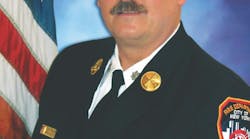Why do some people have a tendency to cause problems for other people? For those of you who have been in the fire service for more than a day, particularly fire officers, interpersonal relationships form the foundation of fighting fire. Any time two or more people get together, you have the potential for misunderstandings, problems and outright arguments.
Why? Because we are all unique individuals. And that uniqueness forms the very basis for the problems. It is my intention to explore the factors that make up the personality of an individual.
People come in all types
Leaders must learn to deal with people. And you cannot be successful at this unless you UNDERSTAND people.
Why do people develop as they do? There are a number of factors that were ignored by such early management theorists as F.W. Taylor. Taylor’s studies led to his theory of the “well-oiled machine.” The person doing the work in that machine was but a cog to be manipulated. The work itself was considered to be a variable.
In the early 20th century, the focus of the theorists began to shift. Studies by Dr. Elton Mayo of Harvard caused the changing tides to flow into a groundswell of support for the humanist approach to management. His work led us in the direction of considering human behavior, itself, as an important variable in the management equation.
Some of the important findings of Mayo’s work dealt with such concepts as:
• Peer pressure – The effect of the group on the individual
• Informal group – The relationships that are formed in the work group
• Informal leader – The person who receives the respect and deference of the group, and serves as its unofficial spokesperson
• Group norms – The behavior expected of group members as determined by the unofficial interaction of the group’s members
Let’s begin by defining the term behavior. Simply stated, behavior revolves around the actions of the individual. We study how people act and explain why they do so in order to predict how they will act in the future and perhaps influence those outcomes.
This is complex in that individuality stands in the way of pat answers. Variables impact upon the individual to shape just who and what we are. One set of variables involves body styles.
Three basic body styles run throughout the whole of the human race. You have the endomorph, the mesomorph and the ectomorph. It is my opinion that body type presents a clue to a person’s personality. Body type in no way completely determines personality, but I maintain it can be used as a first clue to a person’s personality.
What are the traits that can be attributed to each body type?
• Endomorph – The happy chubby fellow who is not physically active and prefers to relax
• Mesomorph – The muscular, action-oriented/physical person
• Ectomorph – The thin and nervous/high-strung person who is usually shy and hesitant to act
How will this information affect your ability to supervise your troops? Let me give you some clues. I am an endomorph. A person charged with supervising me must guard against my propensity for procrastination. I do a fine job as long as I feel like it. On those other occasions, a slight prod is very efficient.
Were you supervising mesomorphs, you might have to ride hard on them. They would attack their work like a fullback, taking the handoff into the line and perhaps stepping on their co-workers in the process. You have to run interference and occasionally put the brakes on their efforts.
The hardest to handle are the ectomorphs, for they are easily discouraged. You must create an environment where they feel comfortable enough to be a full participant. The results can be well worth the effect, as these people are frequently very creative and innovative.
If you are to succeed in your quest for the gold, you will have to recognize that different personalities require different efforts on the part of the supervisor. Give your people the attention they need, play up their strong points and seek ways to compensate for what they lack. It will pay great dividends for you.
Dr. Carter shares his perspectives in his “The View From my Front Porch” blog at:
http://www.firehouse.com/blogs/the-view-from-my-front-porch.





